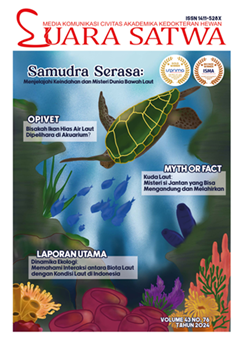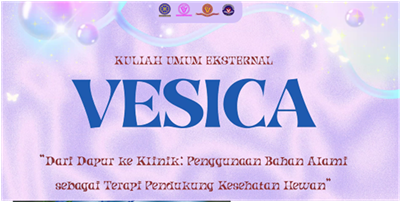Program Pendidikan Profesi Dokter Hewan
The aim of the FKH Unud Veterinary Professional Study Program is to produce graduates with certain skills (profiles) so that they are able to carry out work related to scientific fields such as researchers, academic staff, civil servants, practitioners and entrepreneurs, as well as continuing their studies at a high level. The profile or skills of graduates of the Veterinary Medicine Study Program FKH Unud are:
1. Have high ethics and morals, have an independent, superior and responsible spirit, and be able to communicate for veterinary medical purposes orally and in writing.
2. Able to conclude the condition of healthy and sick animals through anatomical, physiological descriptions, clinical symptoms, pathological changes, and appropriate laboratory diagnostic techniques and lege artis to base the diagnosis of animal disease.
3. Able to design animal health concepts to protect, secure and guarantee the health and welfare of animals, humans and the environment through the rejection, prevention, control, eradication and treatment of animal and zoonotic diseases appropriately based on statutory regulations in the field of animal health management.
4. Able to provide alternative designs for solving animal health problems, quality and safety of animal products, as well as animal welfare to advance animal, community and environmental health through promotive, preventive, curative and rehabilitative actions.
5. Master veterinary sciences so that you can conceptually conclude the condition of healthy and sick animals.
6. Master the concept of animal health so that it can protect, secure and guarantee public health and the welfare of animals, humans and the environment.
7. Able to be academically responsible for the composition of concept designs independently or in working groups under guidance.
Learning Achievements of Veterinary Graduates
A. After completing education at the FKH Unud Veterinary Professional Program, veterinarians are able to appreciate and implement the following attitudes:
1. Be devoted to God Almighty and be able to show a religious attitude.
2. Uphold human values in carrying out duties based on religion, morals and ethics, as well as culture.
3. Contribute to improving the quality of life in society, nation, state and the progress of civilization based on Pancasila.
4. Act as a citizen who is proud and loves the country, has nationalism and a sense of responsibility to the state and nation.
5. Respect the diversity of cultures, views, religions and beliefs, as well as other people's original opinions or findings.
6. Work together and have social sensitivity and concern for society and the environment.
7. Obey the law and be disciplined in social and state life.
8. Internalize academic values, norms and ethics.
9. Demonstrate a responsible attitude towards work in their field of expertise independently.
10. Internalize the spirit of independence, struggle and entrepreneurship.
B. After completing education at the FKH Unud Veterinary Professional Program, Veterinarians master general theoretical concepts in the field of veterinary knowledge and in-depth theoretical concepts in specific parts of the field of veterinary knowledge so that they are able to formulate solutions to procedural problems such as the following.
1. Mastering veterinary sciences (anatomy, physiology, biochemistry, genetics, pharmacology, microbiology, parasitology, pathology, immunology, reproduction, surgery, internal medicine) to determine the systemic structure and function of healthy animals, and all aspects of animal management.
2. Master the knowledge to assess animal behavior and environmental factors in handling and controlling animals.
3. Master research methods and their application to all aspects of veterinary science.
4. Know the basic concepts of animal disease regarding etiology, pathogenesis, clinical signs, steps for making a diagnosis, and physiopathology that occurs in animals,
5. Mastering knowledge about veterinary legislation as well as related fields and professional ethics.
6. Mastering knowledge about types of pharmaceutical ingredients, drug preparations and preparation methods based on doctor's formulas, and the concept of antimicrobial resistance (AMR).
7. Mastering knowledge about the nutritional content of animal feed ingredients, compiling rational economical feed formulas and dietetics/health nutrition.
8. Master and establish disease prevention measures based on the principles of animal health, health promotion and animal welfare,
9. Master knowledge related to veterinary public health, epidemiology and veterinary economics, zoonoses, and the emergence of new infectious diseases.
10. Mastering technology regarding normal and abnormal obstetrics, reproductive systems and animal reproductive technology.
11. Master the concepts of leadership, entrepreneurship, and personal and social communication techniques.
12. Master the knowledge and skills in applying management



UDAYANA UNIVERSITY